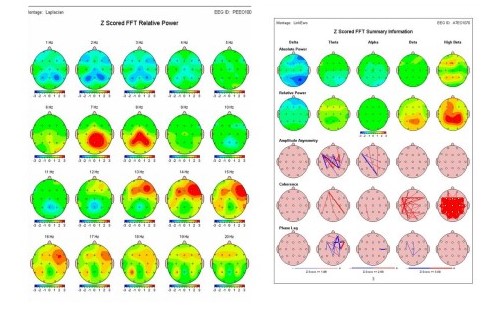An emerging technology called neurofeedback therapy is becoming increasingly popular as a diagnostic and treatment for mental health conditions, from ADHD to anxiety disorders, by “training” specific brain signaling. The treatment can be paired with medication, or it can be medication free, supported by talk therapy.
Patients living in downstate Delaware lacked easy accessibility to the therapy until 2021, when Enhanced Edge — a 2022 EDGE Grant recipient and 2023 RealLIST Startups honoree — launched in Dover as an addition to Mental Edge, a mental health counseling office founded by John Vander Ven, Jr. and Julia Pritchett. Kenneth Phillips and Hunter Melson round out the team of four Enhanced Edge co-owners aiming to make the tech as accessible as possible to downstate Delawareans.
What is neurofeedback?
The tech that Enhanced Edge uses is called Quantitative Electroencephalogram (QEEG) Brain Mapping, where a dry, multi-electrode device connected to a computer is placed on the patient’s head. (Dry means it uses no gel or saline for conductivity.) Data is collected over roughly one hour, and the data is converted into visual brain maps.
While using electricity in mental health therapy may conjure up images of old-fashioned, high-voltage electroshock therapy, neurofeedback therapy does not send electric currents into the brain, Melson assured this reporter, and it’s neither painful nor damaging.
“Putting the cap on, with its lights and noises and vibrations while it’s calibrating, seems scary, but it’s really not,” said Melson, Enhanced Edge’s operations lead. “We’re not putting anything in the brain.”
As neurotherapy “kits” become trendy for at-home treatments, there’s risk that the therapy won’t work if it’s done without qualified mental health providers, as the initial baseline scan needs to be read properly to create a training plan. Enhanced Edge’s initial scan, called the QEEG report, visualizes the data; for example, it shows red around the brain’s frontal lobe to indicate anxiety or PTSD.
The reports can also show early patterns of dementia or Alzheimer’s disease, according to Phillips — signs that alert the QEEG technician to refer the patient to a neurologist for further testing or treatment.

QEEG reports. (Courtesy images)
While the therapy is used for a variety of issues, it’s been shown to be most beneficial as a treatment for ADHD.
“It’s been used the most for ADHD as a whole,” Vander Ven said. “There are a lot more studies to back the ADHD treatment. We’ve seen benefits with post-traumatic stress disorder, anxiety, depression, all of those things as a whole. Typically we get people that have tried other things and just haven’t found something that’s worked.”
Training the brain
Once Enhanced Edge’s QEEG report is assessed, a training plan is created that may include 10 to 15 hour-long sessions, after which the patient is reassessed.
“It’s like training like an athlete, but instead of training legs or arms, you’re basically training the brain,” Vander Ven said.
“In the training portion, we identify that area that we want to train — say, for instance, we see a marker for depression,” said Phillips, Enhanced Edge’s training lead. “So we’ll use a single electrode on that specific target.”
Patients are then asked to engage in an activity like watching a video or playing a video game while brainwaves are monitored using a specialized brain-mapping software. The technician can actually see the video, and the brainwaves’ effect on the video, as it appears brighter and darker. (Watch the example below to see the effect in action.) The goal is to train the brain to sustain image brightness, which is associated with the area of the brain that is being treated.
Neurofeedback therapy isn’t cheap, running about $100 a session, and it’s not yet covered by insurance at Enhanced Edge. The team is currently working toward getting credentialed with insurance companies as part of the build-up process of renovations and expansion made possible by the EDGE Grant.
“We already have a waiting list on all the major insurances,” Melson said. “We’re just waiting to get those contracts back, and it’s all going to ramp up. In the meantime, we use a lot of the grant for marketing purposes, learning new technology and building on our infrastructure, redoing our waiting room and our treatment rooms to match our ‘futuristic’ brand.”
Eventually, the location will be able to handle a large number of Dover-area patients. In the meantime, it offers neurofeedback therapy twice a week.
Join our growing Slack community
Join 5,000 tech professionals and entrepreneurs in our community Slack today!
Donate to the Journalism Fund
Your support powers our independent journalism. Unlike most business-media outlets, we don’t have a paywall. Instead, we count on your personal and organizational contributions.

Traditional PPE isn’t made for everyone. Here’s how one startup is fixing it.

The reversible power test: Free speech and the DEI backlash

Comcast introduces ultra-low lag Xfinity internet that boosts experiences with Meta, NVIDIA and Valve


